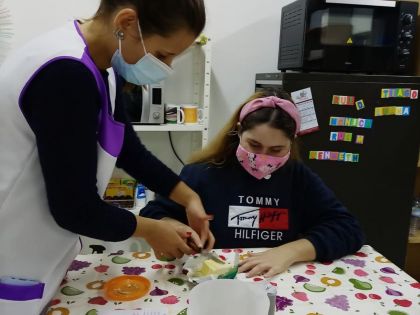“Everyone has biases”, Nuno Miguel Neto, relationship manager at APEXA, begins by telling us. “There is no one who doesn't have a predefined idea of what a disability is”, he added.
Disability is a sensitive topic - many people really don't know how to deal with it. Facing another person who is somehow different from us can lead to any kind of preconceived opinion that is not based on reason or real experience. This is how prejudice is born.
Furthermore, the main objective of APEXA - a private social solidarity institution that supports people with and without disabilities in rehabilitation, education, health and sports throughout the Algarve - is to make the community more inclusive.
Indeed, APEXA has done a great job on promoting inclusion through three fundamental aspects: providing tools for people with disabilities to help them developing their high potential, but also supporting their families and educate the community.

LACUS Project
With all this in mind, APEXA has extended its services to Lagoa, a municipality where it made sense to start the LACUS project in 2019. “In this case, it was created in Lagoa because there was no such project here in the municipality. However, this project not only responds to the needs of Lagoa, but also responds to the needs of neighbouring municipalities such as Portimão, Silves, Monchique and Lagos”.
At LACUS, the project is aimed at young people who have left school but are not yet working. At the moment LACUS has people aged between 18 and 38 years old. “The conditions to be included in APEXA are to need help, whatever it may be”. Even though there are some specific conditions that they may not be able to answer, “we always try to include everyone – if not in LACUS, APEXA has more projects”, Nuno said.
In the LACUS project, the highly motivated team not only works on autonomy, but also on the empowerment of people. “We work to empower individuals and raise their self-esteem, because many of them came here believing they weren't worth it. When we asked them what their dreams were, or what kind of goals they had, they didn't have any”, said Cátia Pinto, Psychologist and coordinator of the LACUS project
However, “this year we feel that they are much better in this regard. We continue to do this work so that they do not lose those skills, but we are betting on their autonomy as well”, she said.
“Regardless of their limitations, we want them to lead a so-called normal life. That is, within their limitations, we want them to get the most out of it”, explained Nuno. It can be simple things such as going to the supermarket or to visit relatives, but it can also be getting a job.
Working with families is key
“We try to combat the idea that some people have that ‘I came here to drop off my son and then I came to pick him up’. That's not what we want,” Nuno said.
“Working with families is the hardest part of our job, because families were never educated for this. For example, we had a case in which the person was ready to start working and the company was prepared to receive her, but later the family said that she cannot work. That's why this work with families is so important”, he told The Portugal News.
“There is a tendency towards overprotection of families and, often, protection is so intense that they take away their skills and autonomy. This work with families is difficult in this sense because here we work on some aspects that are not followed up at home. They assume that their children can't do things”, Cátia Pinto said.

When sympathy becomes rude
In addition, APEXA wants to involve the community, “but it's not so much about awareness, it's more about community education,” Nuno said. In fact, changing the mind set within the community is not just an important factor, it's a mission. In this sense, community intervention is one of APEXA's fields of work.
As the well-known Montessori says: “All unnecessary help is an obstacle to development”. Sometimes people want to help, but they end up cutting off their autonomy and making them feel like they can't make it.
How can I be helpful without being inconvenient? This is the question that follows. There are several people who really want to help, but end up making mistakes. Help has to come when the person asks for help or when we see that the person is struggling, until then we should let the person be independent.
Above all, Cátia and Nuno recommended: “letting go of prejudices, having an open mind and acting naturally because if you think of it, we are all disabled, we all have some limitations. We just need to treat them like people,” they said.
For more information about APEXA or particularly on the LACUS project, please see https://apexa.org/
Paula Martins is a fully qualified journalist, who finds writing a means of self-expression. She studied Journalism and Communication at University of Coimbra and recently Law in the Algarve. Press card: 8252











Able-bodied persons and persons with disabilities need to be made equal and important contributors to serving Planet Earth, our Common Home.
By Dr.Cajetan Coelho from Other on 01 Apr 2022, 10:43